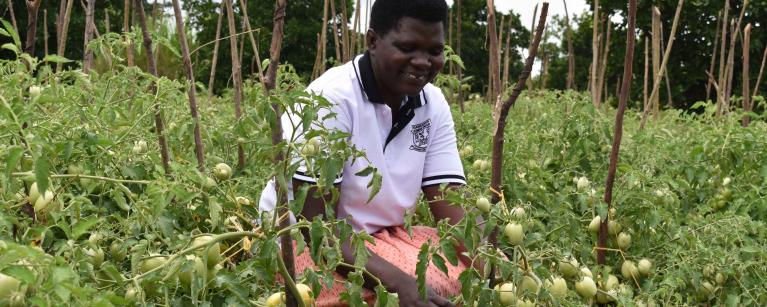Betty Asio's home is a five-minute walk from the community road in Onyerai village, Asuret, Soroti District. Although it's a short distance away, the huge overgrown fruit trees and crops surrounding it make it impossible to identify.
As you get closer, you notice tall sticks and pillars rising from a garden that appear whitish-green. It's hard to tell if the garden contains cabbage or sukuma-wiki, but the sticks and pillars contribute to the confusion.
As you get closer, it becomes clearer that the pillars are supporting the tomatoes. The tomato vines hang onto the stick and one can see a rich blend of green glossy unripe tomatoes that fill the garden and though. Though not yet red, their size and shape already hint at the promise of a bountiful harvest.
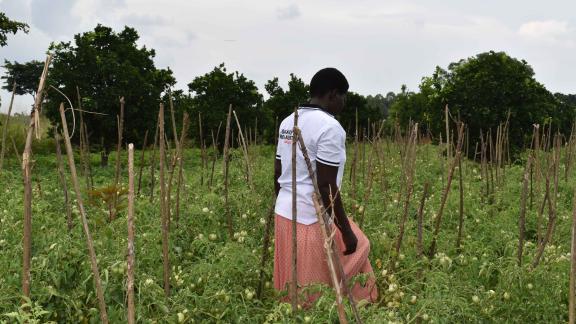
Betty Asio is a member of Egangainos Farmer Field School, monitoring the tomato garden
You definitely would imagine a lot of fertilizers were applied. To my amazement, organic manure was used. The plants are flourishing, a clear sign of proper care, good soil, and healthy organic farming.
In 2025, Betty's group began training in organic farming, moving away from the harmful chemical pesticides and fertilizers they had relied on for years.
“We used to grow tomatoes and vegetables using chemicals, but after learning the dangers to both crops and our health. We resorted to organic pesticides,” Betty explains.
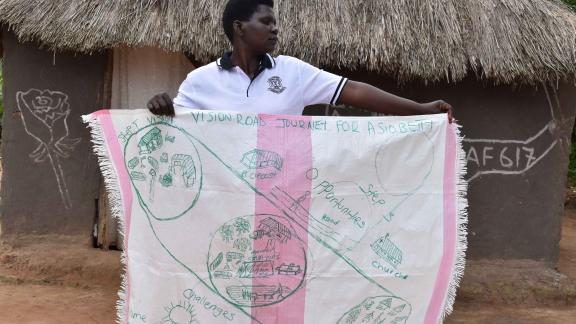
Betty Asio, showcasing her Vision Journey that she uses in her household after receiving a training in GALS methodology
With training from Community Integrated Development Initiatives (CIDI), the group learnt how to make organic manure and fertilisers.
Manure and organic fertilizers are made from locally available materials, including water and cow dung or chicken droppings. These materials are collected in a free polythene bag (which is not airtight) and submerged in water for a specific period.
This method allows farmers to easily produce their own organic fertilizers.
Organic pesticides contain ash, white star soap, ginger, garlic, red pepper and its stem which are boiled and are ready for application after cooling.
“Organic fertilizers smell better, are healthier, and are much cheaper than industrial ones. They work well on mangoes, oranges, and other vegetables”
Encouraged by the benefits, Betty started her trial tomato garden following good agronomic practices such as mulching and applying organic practices.
“I earned UGX 400,000 from a small plot, selling each kilogram at UGX 1,000. That inspired me to plant more.” Betty shares.
She then offered the plot in her back yard for the group to extend tomato planting. They cultivated a half-acre garden with 500 tomato seedlings. This is a garden that can be seen from a distance as you approach her home.
“Each plant produces about 50 fruits, and we use only organic manure and pesticides. Other farmers visit us, surprised by the quality and wondering what we use. They can’t believe it’s all organic,” she adds.
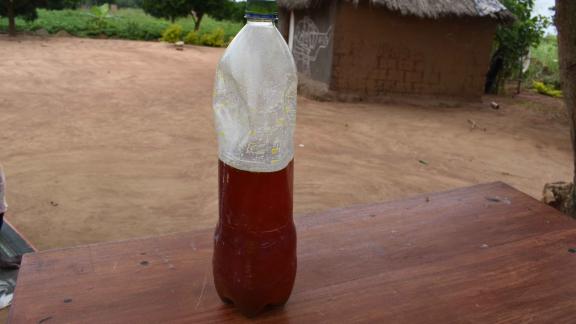
A bottle containing a sample of organic pesticides. Organic pesticides contain ash, white star soap, ginger, garlic, red pepper and its stem which are boiled and are ready for application after cooling. Egangainos Farmer Field School group is planning to start producing organic fertilizers and pesticides in response to the increasing demand from community members who are not part of the Farmer Field School.
The garden according to Betty has a centre of attraction and amazement in the village, given the fact that no chemical pesticides were used.
As a way of scaling up, Betty says that the group plans to start producing organic fertilizers and pesticides in response to the increasing demand from community members who are not part of the Farmer Field School.
Betty also grows ground nuts, sweet potatoes, cassava and citrus fruits. To support her household further, Betty also sells roasted ground nuts, pork, and other homemade snacks.
Beyond making organic fertilizers, the project is promoting the adoption of agroecological practices and crop diversification, strengthening community-led management of biodiversity and ecosystems as well as enhancing capacities for climate change adaptation and mitigation.
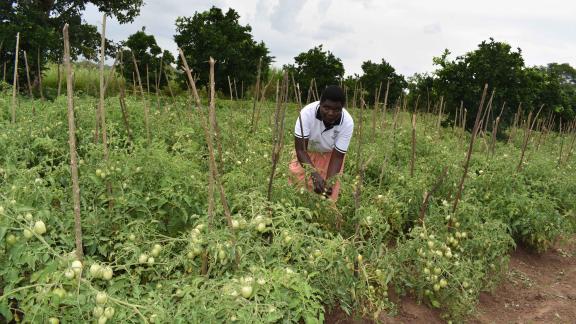
Working as a group
Betty Asio is a member of Egangainos Farmer Field School, comprised of 30 members, found in Onyerai, Asuret Soroti District that meets every Tuesday.
The meeting covers activities related to both the tomato garden and the Village Savings and Loan Association (VSLA). Within the VLSA, each member saves UGX 5,000 weekly, which strengthens their financial abilities and fosters unity within the group.
In addition to planting tomatoes, the group has also cultivated two acres of groundnuts to improve their food security and increase their income.
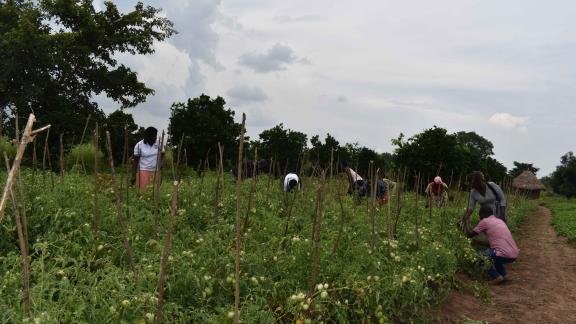
Egangainos Farmer Field School, comprised of 30 members, found in Onyerai, Asuret Soroti District that meet every Tuesday. working in the tomato garden
The group is also involved in the making of energy-saving stoves. ‘We make energy-saving stoves to reduce firewood consumption and smoke in our homes. We visit fellow members and construct the stoves for them at no cost," Betty notes.
Though marketing is still a challenge, they promote their products at trading centres and local village markets. This is how the local communities are improving livelihoods, protecting the environment, and proving that sustainable agriculture is possible from the ground up.
About the project:
With funding from SIDA, Oxfam in partnership with Participatory Ecological Land Use Management (PELUM) Uganda, Eastern and Southern Africa Small-scale Farmers’ Forum (ESAFF), and Community Integrated Development Initiatives (CIDI), is implementing a four-year project in Adjumani, Apac, Amuria, and Soroti districts, targeting rural women and their communities, particularly smallholder food producers, climate change activists, land rights advocates, and local government technical teams and land boards agents of change in building a fair, green, equal, and safe world.
